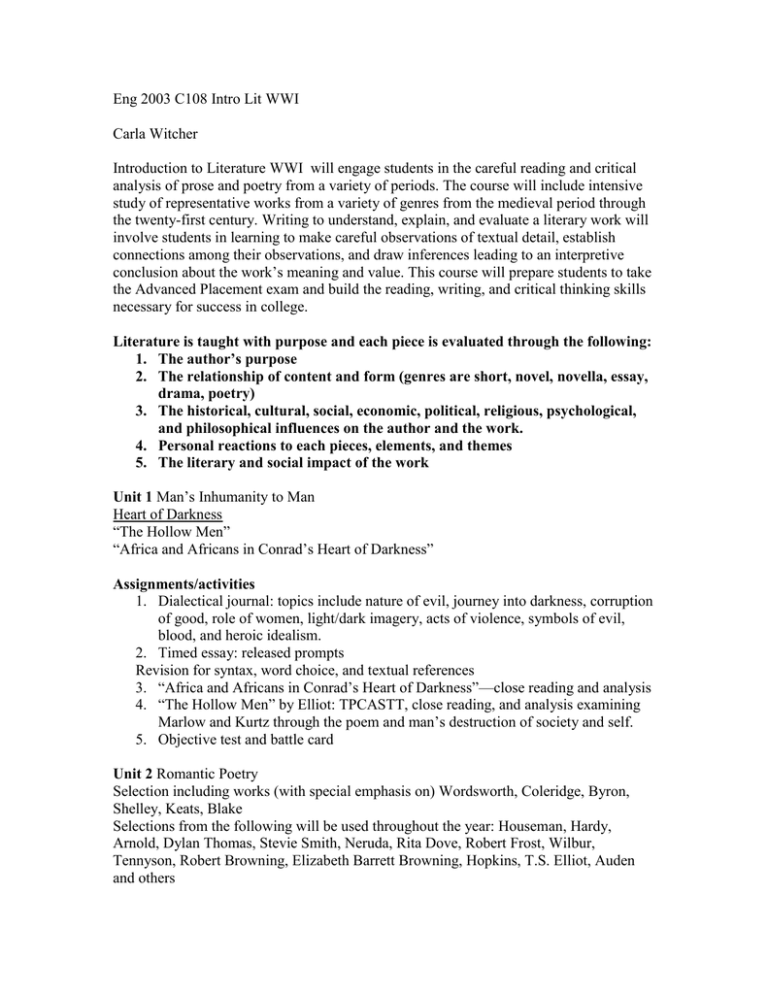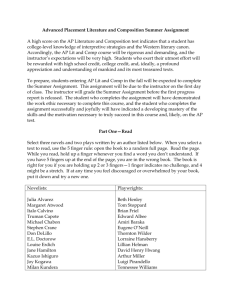
Eng 2003 C108 Intro Lit WWI
Carla Witcher
Introduction to Literature WWI will engage students in the careful reading and critical
analysis of prose and poetry from a variety of periods. The course will include intensive
study of representative works from a variety of genres from the medieval period through
the twenty-first century. Writing to understand, explain, and evaluate a literary work will
involve students in learning to make careful observations of textual detail, establish
connections among their observations, and draw inferences leading to an interpretive
conclusion about the work’s meaning and value. This course will prepare students to take
the Advanced Placement exam and build the reading, writing, and critical thinking skills
necessary for success in college.
Literature is taught with purpose and each piece is evaluated through the following:
1. The author’s purpose
2. The relationship of content and form (genres are short, novel, novella, essay,
drama, poetry)
3. The historical, cultural, social, economic, political, religious, psychological,
and philosophical influences on the author and the work.
4. Personal reactions to each pieces, elements, and themes
5. The literary and social impact of the work
Unit 1 Man’s Inhumanity to Man
Heart of Darkness
“The Hollow Men”
“Africa and Africans in Conrad’s Heart of Darkness”
Assignments/activities
1. Dialectical journal: topics include nature of evil, journey into darkness, corruption
of good, role of women, light/dark imagery, acts of violence, symbols of evil,
blood, and heroic idealism.
2. Timed essay: released prompts
Revision for syntax, word choice, and textual references
3. “Africa and Africans in Conrad’s Heart of Darkness”—close reading and analysis
4. “The Hollow Men” by Elliot: TPCASTT, close reading, and analysis examining
Marlow and Kurtz through the poem and man’s destruction of society and self.
5. Objective test and battle card
Unit 2 Romantic Poetry
Selection including works (with special emphasis on) Wordsworth, Coleridge, Byron,
Shelley, Keats, Blake
Selections from the following will be used throughout the year: Houseman, Hardy,
Arnold, Dylan Thomas, Stevie Smith, Neruda, Rita Dove, Robert Frost, Wilbur,
Tennyson, Robert Browning, Elizabeth Barrett Browning, Hopkins, T.S. Elliot, Auden
and others
Assignments/activities
1. Close reading/analysis of selected poems as class study
2. TPCASTT
3. Written explication
Unit 3 Evolution of the hero/tragic hero, Fate & Freewill, Power
Native Son
Assignments/activities
1. Dialectical journal: topics to include blindness, the cross, snow, communism,
religion, family relationships, tragic hero
2. Timed essay: prompts from released AP Question 3
3. Applied Practice multiple choice
4. Native Son objective test and battle card.
Unit 4 Anglo-Saxon and Medieval Literature
Common themes: evaluation of the hero, literature as a window to the world of other
times and peoples, and the influence of Christianity on literature.
Beowulf
Selection from Grendel John Gardner
“The Prologue to the Canterbury Tales”
“The Pardoner’s Tale”
“The Nun’s Priests Tale”
“Sir Gawain and the Green Knight”
Focus on methods of characterization, satire, and irony
Assignments/activities
1. Free writing—How is the hero changing? What is your definition of a hero?
2. Students write to explain why Beowulf was a hero to the Anglo Saxons and
compare/contrast him to the modern hero.
3. Students write to explain the use of irony and satire in Chaucer’s tales.
4. Reading quiz
5. Unit test
Unit 5 Utopia/Dystopia
Brave New World
“Harrison Bergeron”
“Epicac”
Assignments/activities
1. Reading responses to rhetorical devices used to develop the author’s tone:
Vonnegut
2. Brave New World timed essay –AP argumentative prompt with textual support
Revision for active voice, textual support and commentary, sentence variety, and
word choice
3. Brave New World dialectical journal and class presentation: topics including
allusions, tragic hero, alienation, and propaganda techniques
4. Reading quiz
Unit 6 College Applications/ Scholarship Essay
Assignments/activities
1. Letter of recommendation
2. Resume
3. Formal college scholarship essay: prompts from a variety of colleges
Revision for voice and specific detail
Unit 7 Catch-22 (Satire)
“The Unknown Citizen”
Common themes: sanity and insanity, heroes and heroism, absurdity and inefficiency of
bureaucracy, inevitably of death, greed, personal integrity
1. Dialectical journal
2. Timed essay: released AP prompts
3. “The Unknown Citizen” TPCASTT and analysis examining the idiosyncratic
nature of bureaucracy
4. Reading Quiz
5. Objective test and battle card
Unit 8 Macbeth
Assignments/activities
Common themes: Fate & Freewill, Ambition, Power, Versions of Reality, Gender, The
Supernatural, Violence, Time
1. Dialectical journal topics: revenge, disease, spies, actors/stage, disruption of
natural order
2. Reading quizzes
3. Objective test and essay test
4. Imagery chart
5. Imagery essay emphasizing textual references and commentary, sentence
variety—Especially sentence beginnings, smooth incorporation of quotations into
the syntax
6. Poster over Kholberg’s Stages of Moral Development
7. Battle Card
Unit 9 Elizabethan/Metaphysical Poetry
Selections including Shakespeare, Spenser, Sidney, Marvell, and Donne
Emphasis on close reading, poetic structure, conventions, and sonnet style
Assignments/activities
1. Selected poems, particularly by Shakespeare and Donne, for class study,
TPCASTT modeling and analysis
2. Use TPCASTT and other reading strategies to interpret a poem and present it to
the class
3. Comparison/contrast poetry essay
4. Recognize and understand the use and purpose of poetry literary terms
Unit 10 Overwhelming Question Research Paper
Students will utilize the Overwhelming Questions list to address one question with one or
more of the works discussed in class.
Assignments/activities
1. Submit proposal/thesis statement based on Overwhelming Question
2. Close reading and annotation of in class text
3. Support original thesis and research topics with textual references and literary
criticism.
4. Write a formal literary analysis research paper: 5 sources, 6-8 pages, MLA format
with works cited page
Focus: documentation, evaluation of literary criticism sources, literary analysis, close
reading and evaluation, organization, revision editing, and publishing
Unit 11 The Awakening
Focus on close reading, literary analysis, and imagery
Assignments/activities
1. Style analysis/close reading from brief selected passages
2. Dialectical journal topics: sea, birds/flight, dreams/waking, sound imagery,
character analysis
3. Class presentation of journal motifs
4. Reading Quiz
5. Objective test and battle card
6. Literary analysis essay modeled after or based on released AP prompts
Message Boards
Students will be required to create responses as well as answer other student responses.
Battle Cards
Students complete a 5x8 note card for each play or work that we study. This “battle card”
will include a plot summary, list and description of major characters, point of view,
setting, tone, examples of irony and symbols, theme, explanation of title, and a
memorable quote. These cards are used prior to the AP test to review major works.
Vocabulary
In addition to encouraging wide and varied reading to foster vocabulary development,
students learn new words throughout the year using the text Vocabulary for
Achievement, 6th course.
Skill builders
We will begin class most periods with a brief proofreading, editing, usage, sentence
combining, or literary term review activity. Students keep these skill builders in their
notebooks until the end of the grading period. Students at this level are expected to have a
good command of standard written English and usage; however, we will address common
mistakes in mini lessons as needed.
Scoring rubric
All essays are scored with a rubric, which evaluates thesis/introduction, concrete details
and commentary, consistent verb tense, point of view, sentence structure and variety,
appropriate grammar and usage, sophistication of word choice, organization, and
transitional devices. Students work through all steps of the writing process: prewriting,
writing, revision, and publishing. Students have many opportunities to revise/edit their
own papers as well as participate in peer editing.
AP test practice
Throughout the year, students practice on released prompts and multiple choice practice
questions based on works that we are studying. Small groups frequently outline, under
time restraints, responses to a variety of prompts and participate in frequent close
reading/style analysis passages from our texts or from the Jane Schaffer style analysis
packet. The two weeks prior to the AP test we review battle cards in preparation for the
open literary question and practice, in small groups as well as individual situations,
responding to poetry prompts and close reading prompts. Released items are used
frequently throughout the year as essay prompts.
Textbooks:
Carroll, Joyce, ed., et al. Writing and Grammar: Diamond Level. Upper Saddle River,
New Jersey: Pearson Prentice Hall, 2004.
Kinsella, Kate, ed., et al. Literature: The British Tradition. Upper Saddle River, New
Jersey: Pearson Prentice Hall, 2005.
Richek, Margaret. Vocabulary for Achievement. 6th course. Wilmington, MA: Great
Source, 2005.
Trimmer, Joesph F. A Guide to MLA Documentation. 5th ed. Boston: Houghton Mifflin,
1999.
Novels and plays:
Conrad, Joseph
Heart of Darkness
Wright, Richard
Native Son
Huxley, Aldous
Brave New World
Shakespeare
Macbeth
Chopin, Kate
The Awakening
Heller, Joseph
Catch-22
Supplemental materials:
Selections from
Applied Practice books; Pre-AP version. Austin: Applied Practice, 2001.
Deluzain, H. Edward, ed., et al. Adventures in English Literature: Athena ed. Austin:
Holt, Rinehart, and Winston, 1996.
Miller, George, ed. The Prentice Hall Reader. 7th ed. Upper Saddle River, New Jersey:
Pearson Prentice Hall, 2004.
Schaffer, Jane. Style Analysis. San Diego: Jane Schaffer Publications, 1995.

![Submission 68 [doc]](http://s3.studylib.net/store/data/008000926_1-fed8eecce2c352250fd5345b7293db49-300x300.png)


